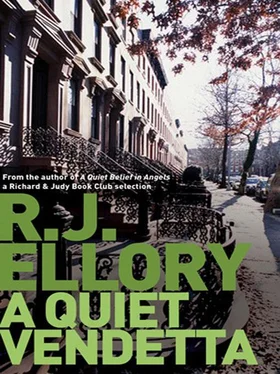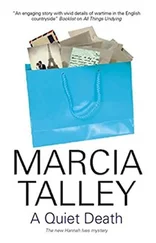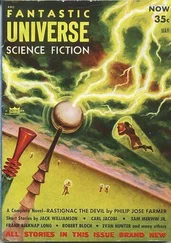But it had never been about that. It had been about revenge. Perez had dug two graves, and it seemed as if both of them would be filled one way or another.
*
They found the transporter and the Recovery Unit no more than five miles from the Royal Sonesta, outside of a small town called Violet on Highway 39. Hartmann skidded to a stop and he and Woodroffe went at a run towards the vehicles.
The Recovery Unit Chief was standing over someone, and for a moment Hartmann believed he would find Schaeffer lying there at the side of the road with a bullet hole in the back of his head, but as he came around the side of the vehicle he found Stanley Schaeffer standing there, very much alive, speechless but very much alive, and he was looking down at something he held in his hand.
Hartmann walked over slowly. On the ground at Schaeffer’s feet were torn strips of duct tape, tape that had been used to bind him, and to the side of that a canvas bag that – more than likely – had been put over his head.
Schaeffer saw Hartmann coming and held out his hand.
Hartmann approached slowly, almost afraid of what he might see.
Schaeffer’s hand opened, and there within – small and silver, reflecting what little light was left in the sky – was a single dime.
Hartmann shook his head. ‘Ten Cent,’ he said.
‘The older one,’ Schaeffer said almost disbelievingly, ‘and the younger one-’
‘Was Victor Perez,’ Hartmann interjected.
He turned and looked at Woodroffe. Woodroffe shook his head slowly and looked down at the ground.
‘There was someone here waiting for them,’ Schaeffer said. ‘There was a car here waiting for them. They taped my hands and feet, they put a bag over my head. I didn’t see them, but it was definitely a girl… definitely, definitely a girl.’
‘Catherine Ducane,’ Woodroffe said. ‘They took us, didn’t they? Perez and his son, the girl as well… they took us all completely.’
Hartmann stood there, his heart like a cold stone in the middle of his chest. He breathed deeply. He steadied himself against the threatened loss of balance that assaulted him, and then he walked to the side of the road and sat down. He put his hands over his face, he closed his eyes, and it was a long time before he could even consider what he was going to do next.
*
Reports came later, inconsistent, inconclusive – but for one key fact.
Federal Bureau of Investigation agents, members of the ATF and DEA had raided the property of Antoine Feraud.
Daddy Always.
Men had been killed on both sides. There were numerous fatalities and woundings. Even as those reports came in, even as Hartmann listened to the words that were relayed back to the Royal Sonesta through Lester Kubis, men were being ferried to the Emergency Room in New Orleans suffering gunshot wounds. But one thing was known for sure.
Daddy Always was dead. Standing at the top of the stairwell in his own house he had fired on FBI agents as they came in through the front door. He went down in a hail of gunfire. He went down fighting back, and even as his body fell down two flights of stairs, even as his old and broken form lay spread-eagled at the foot of the risers, blood making its cautious way from his head and out across the deep polished mahogany flooring, Governor Charles Ducane’s heart monitor flatlined while surgeons attempted to remove a third bullet from an arterial channel close to his heart.
They died within moments of one another, and had they known, had they been aware of that narrow coincidence, they might perhaps have been amused at the irony. As, undoubtedly, would Ernesto Perez, crossing the Louisiana stateline into Mississippi beside a tributary of the Amite River.
Night was closing in. The lights of the Royal Sonesta burned bright. Federal agents returning from the Feraud property were gathered and briefed. Even Verlaine was there, aware that all hell had broken loose and eager to understand what had happened in his territory.
And it was he who stood beside Ray Hartmann when Michael Cipliano showed up, beside him Jim Emerson and in his hand the report prepared from the clothes they had processed from the Shell Beach Motel.
‘Her clothes alright, no question about it,’ Cipliano told Hartmann. ‘Nothing out of the ordinary, ’cept for this one little thing.’
Hartmann, his mind too overwhelmed with all that had happened to cope with anything else, merely looked back at Cipliano.
‘Back of her jeans we found some blood… tiny little spots of blood around the edge of the rivets-’
Hartmann knew what Cipliano was going to say before he uttered the words.
‘Except it wasn’t blood, Mr Hartmann… it was burgundy paint, the kind you’d find on a ’57 Mercury Turnpike Cruiser.’
Cipliano was smiling, as if everything the world had to offer had now fallen into place.
‘We estimated the carrier’s height at maybe five-foot ten or eleven. Catherine Ducane was five-foot seven, but along with her jeans you brought a pair of three-inch high-heeled shoes…’
Hartmann closed his eyes. He stepped past Cipliano and Emerson and walked out into the street. He stood there on the sidewalk, the noise behind him blurring into nothing.
He inhaled, exhaled, inhaled once more… and then he found it: the ripe malodorous blend of smells and sounds and human syncopations; the heat of rare ribs scorching in oiled flames; the bay leaf and oregano and court bouillon and carbonara from Tortorici’s; the collected perfumes of a thousand million intersecting lives, and then each life intersecting yet another like six degrees of separation; a thousand million beating hearts, all here, here beneath the roof of the same sky where the stars were like dark eyes that saw everything… saw and remembered…
He thought of Danny, of looking out over the trees, out over the Mississippi to the Gulf of Mexico, a band of clear dark blue, a stripe through the earth, a vein… how they used to dream of sailing away, a paper boat big enough for two, its seams sealed with wax and butter, their pockets filled with nickels and dimes and Susan B. Anthony dollars saved from scrubbing wheel arches and hub caps, from soaping windscreens and windows and porch stoops for the Rousseaus, the Buies, the Jeromes. Running away, running away with themselves from Dumaine, from the intersection where bigger kids challenged them, tugged their hair, pointed sharpened fingers into their chests and called them weirdo kids, where they ran until the breath burst from their chests in great whooping asthmatic heaving gusts, turning down alleyways, hiding in shadows, the reality of the world crowding the edges of the safe and insular shell they had created for themselves. Danny and Ray, Ray and Danny, an echo of itself; an echo of childhood…
Ray Hartmann felt that vague and indefinable sensation… believed that each time he thought of these things he was younger for the duration.
And then he saw his mother’s face, his father’s too, and within a moment he had to wipe the soft salt-sting of tears from his eyes.
‘It was always here,’ he whispered to himself. ‘Everything I ever was. It was always here.’
And then he turned. Quietly, step by step, he turned and left. Walking slowly now, carefully, each chosen step a moment of thought in itself, and made his way down to the junction.
It was there that he found a callbox, and with his quarters in his hand he dialed the number, a number he could never have forgotten if his life had depended on it.
And he almost broke down in tears when he heard her voice.
‘Ray? Ray, is that you?’
‘Yes, Carol, it’s me.’
New York would never be the same. At least not through Ray Hartmann’s eyes. The eyes that looked out over the skyline as the plane banked and veered towards the airport were different eyes now. It was early afternoon, Tuesday 10 September. Eleven days had passed, during which Hartmann had lived two lifetimes, his own and that of Ernesto Cabrera Perez.
Читать дальше







![Quiet Billie - Don't mistake the enemy [СИ]](/books/421973/quiet-billie-don-t-mistake-the-enemy-si-thumb.webp)




